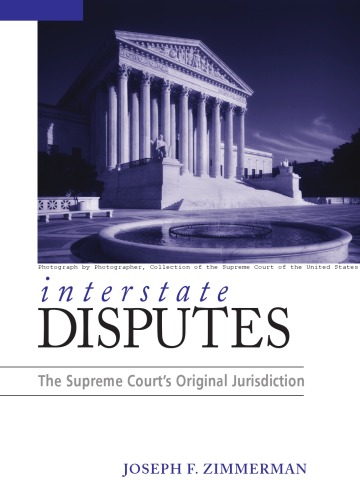

Most ebook files are in PDF format, so you can easily read them using various software such as Foxit Reader or directly on the Google Chrome browser.
Some ebook files are released by publishers in other formats such as .awz, .mobi, .epub, .fb2, etc. You may need to install specific software to read these formats on mobile/PC, such as Calibre.
Please read the tutorial at this link: https://ebookbell.com/faq
We offer FREE conversion to the popular formats you request; however, this may take some time. Therefore, right after payment, please email us, and we will try to provide the service as quickly as possible.
For some exceptional file formats or broken links (if any), please refrain from opening any disputes. Instead, email us first, and we will try to assist within a maximum of 6 hours.
EbookBell Team

4.0
36 reviews
ISBN 10: 0791468348
ISBN 13: 9780791468340
Author: Joseph F Zimmerman
Part I: Foundational Principles and Historical Development
Chapter 1: The Constitutional Framework
1.1 Textual Analysis of Article III, Section 2
1.2 The Federalist Papers and the Intent of the Framers
1.3 The Judiciary Act of 1789 and Early Statutory Interpretations
1.4 The Concept of "Justiciability" in Interstate Disputes
Chapter 2: Historical Evolution of the Doctrine
2.1 Early Cases: Resolving Boundary Disputes (e.g., New Jersey v. New York, Rhode Island v. Massachusetts)
2.2 The Shift to Water Rights and Environmental Disputes (Kansas v. Colorado)
2.3 The "Equitable Apportionment" Doctrine
2.4 The Modern Era: Expanding the Scope of Disputes
Chapter 3: The Supreme Court as a Trial Court
3.1 The Role of the Special Master
3.2 Rules of Procedure and Evidence in Original Jurisdiction Cases
3.3 The Trial-like Process: Discovery, Hearings, and Briefs
3.4 Challenges and Criticisms of the Court's Trial Function
Part II: Substantive Areas of Interstate Disputes
Chapter 4: Boundary Disputes
4.1 The Law of State Boundaries
4.2 Use of Surveys, Maps, and Historical Records as Evidence
4.3 Judicial Deference to Congressional Acts and Interstate Compacts
4.4 Notable Cases: From Land to Water Boundaries
Chapter 5: Water Rights and Riparian Law
5.1 The Doctrine of Equitable Apportionment
5.2 Interstate Rivers, Lakes, and Aquifers
5.3 Allocation of Water Resources for Consumption and Use
5.4 Case Studies: The Colorado River, the Rio Grande, and the Apalachicola River
Chapter 6: Environmental and Resource Disputes
6.1 Pollution and Nuisance Claims
6.2 Interstate Torts and Environmental Harms
6.3 Conservation and Management of Shared Natural Resources
6.4 The Intersection with Federal Environmental Statutes (e.g., Clean Water Act)
Chapter 7: Commercial and Economic Disputes
7.1 Taxation and Regulatory Conflicts between States
7.2 Enforcement of Contracts and Debts between States
7.3 Disputes over the Interstate Transportation of Goods and Services
7.4 The Dormant Commerce Clause and its Relationship to Original Jurisdiction
Part III: Procedural Aspects and Contemporary Challenges
Chapter 8: Jurisdiction and Standing
8.1 Defining "State" for Jurisdictional Purposes
8.2 When Can a State Sue? The Requirement of a "Justiciable Controversy"
8.3 The "Parens Patriae" Doctrine
8.4 Joinder of Parties and the Role of the United States as an Intervenor
Chapter 9: Remedies and Enforcement
9.1 Types of Remedies: Injunctive Relief, Declaratory Judgments, and Damages
9.2 The Power of the Court to Enforce its Decrees
9.3 The Role of Interstate Compacts as an Alternative to Litigation
9.4 Post-Judgment Motions and Compliance Issues
Chapter 10: Contemporary Challenges and Future Directions
10.1 Climate Change and its Impact on Water and Resource Disputes
10.2 Cyber-Torts and Digital Boundaries
10.3 The Political Dimensions of Interstate Disputes
10.4 Is the Original Jurisdiction Still Necessary? Proposals for Reform
Conclusion: A Unique Forum for a "More Perfect Union"
11.1 Summary of Key Principles and Doctrines
11.2 The Supreme Court as an Arbiter of Federalism
11.3 The Enduring Importance of Original Jurisdiction
11.4 Future Prospects for Interstate Dispute Resolution
interstate disputes
constitutional mechanism to resolve interstate disputes
who has the power to decide interstate disputes
militarized interstate disputes
give two examples of interstate disputes
Tags: Joseph F Zimmerman, Interstate, Disputes